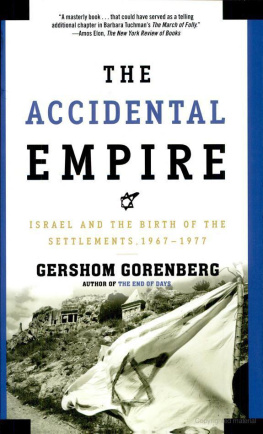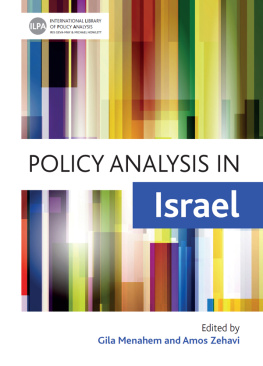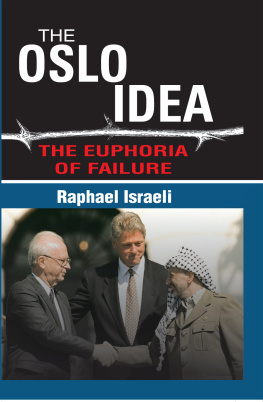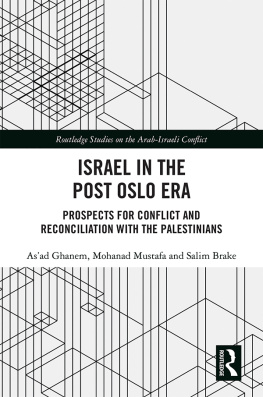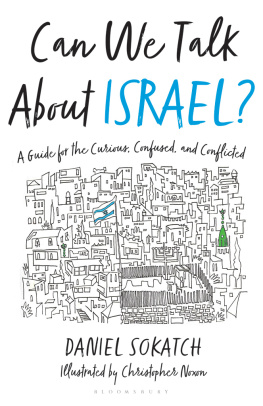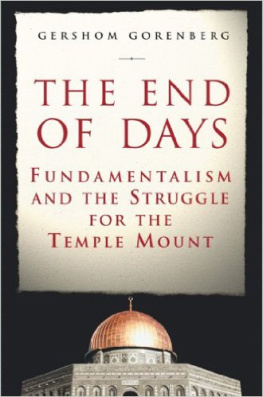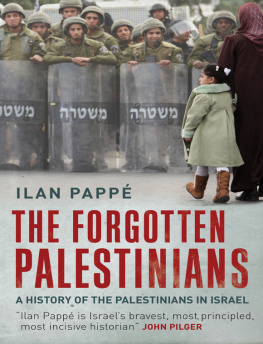The Unmaking of Israel
Gershom Gorenberg

For my children
Yehonatan, Yasmin, and Shir-Raz
the rebuilders
Contents
Chapter I
The Road to Elisha
The Elisha academy doesnt look like the embodiment of three social revolutions. The dining hall facing the brick quad is prefab; the administration building is a mobile home. Only the stone-faced study hallcumsynagogue is a permanent structure. The dorms that house several dozen students are also weather-stained mobile homes, arranged in two concentric semicircles lower on the West Bank hillside. At the compounds entrance a bored Israel Defense Forces sergeant sits in a guard booth. He glances at me through the open car window, sees that Im Israeli, half listens to me say I have an appointment with the dean, and waves me in.
There are no colonnades, no statues of heroes in the quad. Nothing here looks monumental. Rather, the changes in Israeli society that Elisha represents are like shifts in the groundhalf visible, powerful, and ongoing. They create fissures in the foundations of the state. But they are the result of human choices, not forces of nature.
Ive come to Elisha because I am concerned that the state of Israel is steadily dismantling itself, and because Elisha is in several ways a marker of its undoing.
To start, Elisha is an illegal outpost, one of about a hundred small settlements established across the West Bank since the 1993 Oslo Accord committed Israel to a negotiated peace agreement with the Palestinians. Since that agreement, the Israeli government has not approved new settlements in the West Bank. Ostensibly, the settler activists who established the outposts defied the government and the laws in force in Israeli-occupied territory. In reality, multiple state agencies lent a hand, while elected officials ignored or helped the effort. The Housing Ministry spent over $300,000 on infrastructure and buildings at Elisha alone. The army provides soldiers to guard the spot. The purpose of the outpost enterprise is to fill in the gaps between larger existing settlements, to extend Jewish control over West Bank land, to fragment the territory left to Palestinians. It is actually a massive rogue operation, making a mockery of the rule of law.
At the same time, Elisha is an institution of Orthodox Jewish religious study. The students are young men at the end of their teens. The dean is a charismatic rabbi with a quiet, warm voice. By coincidence, he was born in 1967, the year of Israels victory in the Six-Day War. Because of that perceived miracle, a new theology swept much of Israeli Judaism. It described the battlefield triumph as part of Gods plan for redeeming the world, for bringing humankind into the perfected age of the messiah. The theology assigned sanctity to the state of Israel and its military. It made settling Jews in the newly conquered territory a divine commandment as important as all the others combined. The new doctrine constricted Judaisms universal moral concerns, and made militant nationalism a pillar of faith. In his office, explaining his educational message, the dean uses the code words of that theology: his students must understand, he says, that they are part of the redemption of Israel. At the exclamation point of an idea, his eyes widen and a catlike quiver of pleasure runs through his shoulders. He undoubtedly assumes that the skullcap-wearing Orthodox interviewer facing him agrees with him; he has grown up in a community where his views are mainstream, taught in countless state-run religious schools.
Elisha, however, is a very particular kind of school: a pre-military academy. In principle, Israel has a universal draft at age eighteen. But the army grants deferments to high school graduates to spend a year or more at preparatory academies that combine physical training and studies that boost motivation to serve and to rise through the ranks. At Orthodox academies, one goal is to strengthen students faith, so they can resist pressure to give up religious practice during their service. Another goal is to create a cadre of ideologically committed Orthodox officers. Despite being an illegal outpost, Elisha appears on the Defense Ministrys Internet page of pre-military academies. The Education Ministry has provided a third or more of its budget.
During the two decades since the academies began operating, religious men have taken a growing role in the Israeli armys combat units and in its officer corps. Yet the windfall of new manpower comes with a troubling question: How much influence does a politicized clergy have in the military? This question could loom immense if Israel decides to withdraw from the West BankJudea and Samaria, the biblical name for the territory used in Israeli officialese and most public discourse. In the courtyard at Elisha, I ask a young man with a dark shadow of a beard what he would do if he received orders to evacuate a settlement. Im not going to break religious law if all the rabbis say not to, he answers.
On the road to Elisha, no sign marked the line between Israel and occupied territory. I did not expect one. Since 1967, the government has worked to erase that lineon maps, and on the landscape. The road led eastward into the West Bank mountains, past the Palestinian village of Deir Nidham and the suburban homes at the Israeli settlement of Neveh Tzuf, until I reached the chain-link gate. For most Israelis, who rarely venture beyond the edges of occupied territory, Elisha is invisible.
Yet Elisha represents a crossroadsnot on the map, but in Israeli history. The ongoing occupation, the fostering of religious extremism, the undercutting of the law by the government itself all threaten Israels future. In particular, they place its aspiration to democracy deeply at risk. As an Israeli, I believe that the country must change direction. My questionsthe questions I seek to answer in this bookare how Israel reached this point, and what path it must take from here in order to repair and rebuild itself.
There are two common ways of portraying Israel. The first stresses its successes. It has given Jews refuge and sovereignty in their own country. Six decades after its establishment, Israel is a rarity among countries that gained their independence in the era of decolonialization. It is a parliamentary democracy. Economically, Israel has climbed from the Third World to the First, from exporting fruit to exporting software.
The second portrait is of conflictof terror attacks against Israelis, but also of roadblocks, walls, settlements, and Israeli offensives in Gaza and Lebanon. In the media and academic analysis, that picture increasingly focuses on Israels occupation of the territory it conquered in 1967 and the plight of Palestinians living there. The regime in the West Bankor even within Israel itselfis sometimes equated to apartheid. Zionism is cast as a colonial movement, and the displacement of the Palestinians in 1948 is seen as an inevitable consequence of Zionisms nature. The most concise criticism is that Israel is an ethnocracy, as Israeli political geographer Oren Yiftachel argues in his 2006 book of that name. An ethnocracy, he explains, is a regime promoting the expansion of the dominant group in contested territory while maintaining a democratic faade.
The dichotomy between these two pictures is starkand misleading. Nations dont necessarily fit into clean categories; they are not chemical elements. Like a figure in great fiction, Israel is better portrayed through its contradictions, through its tragic flaws and heroic aspirations.
Zionism, understood from within, is the national liberation movement of the Jews. The movement began in Eastern and Central European expanse of overlapping, entangled ethnic groups who by the late nineteenth century were all seeking political self-determination. Jewish life in that region had been precarious and fruitful, but now precariousness was winning out. Zionism defined the Jews primarily as an ethnic group, rather than a religious community. It saw the creation of a Jewish society in the Land of Israel, also known as Palestine, as the rightful repatriation of a stateless, persecuted people to its long-lost homeland. Return, Zionism posited, was the only workable solution of the worlds longest-running refugee problem.
Next page

